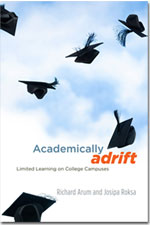On the one hand, a forceful budget of bad news at a time rife with negatives about higher education. On the other, the stubborn hope that we will do better. Those who believe higher education can do a better job—and I am one—will acknowledge the force of Academically Adrift as wake-up call. Although that call is not new, the rhetorical effects of this book are powerful.
Read more ›CURRENT ARTICLE • March 22
OTHER RECENT ARTICLES
Consider the following exam day scenario. While the students are taking their exam, you look up from the paper you’re grading and see a student repeatedly looking at another student’s exam. When your eyes meet his, he appears nervous. What should you do next?
Read More ›College professors have long bemoaned the fact that they view the product or outcome of higher education differently from their students. Ask a professor what the goal of a college education is, and the answer you’re likely to hear is wisdom, knowledge, insight, understanding, or some variant of these. Ask the same question of a student (or that student’s parents), and you’re likely to hear an answer like a diploma, a job, or lots of money. That difference in perspective is certainly not new and, although some generations of college students are more idealistic or socially engaged than others, it’s certainly not surprising that American families tend to make college decisions in terms of return on investment; that’s how they make most of their other decisions, too, at least when the question involves how they should spend their money.
Read More ›Technology enables students to connect with each other, the instructor, and the content. However, distractions—in the form of real-time electronic conversations and a barrage of dozens of commercial and personal interjections—can be omnipresent. Perhaps the online instructor needs to provide his/her own steady stream of engagement that can serve to interrupt (at least temporarily) the flow of extraneous information that competes for both time and focus.
Read More ›This week I’m writing articles for an upcoming issue of The Teaching Professor newsletter and that always prompts lots of reading, thinking, rethinking and revising. Two articles I’m highlighting for the March issue begin with instructional problems, plagiarism in one and poorly written lab reports in the other, which are addressed by thoughtful and creatively designed assignments. With the plagiarism problem, it’s a brand new assignment and with the poorly written lab reports, it’s a complete redesign of the lab report assignment.
Read More ›As the name implies, problems are absolutely essential for problem-based learning (PBL). Problems initiate students’ learning in PBL. In other words, if there are no problems, there will be no problem-based learning.
Read More ›By using Podcasts, vodcasts, and screen capture software to provide supplemental and remedial materials, instructors can focus on higher-order learning activities during class, says Dave Yearwood, associate professor and chair of the Technology Department at the University of North Dakota. In an email interview with The Teaching Professor, Dr. Yearwood shared some ideas for getting started.
Read More ›Obviously the headlines Academically Adrift has generated concern the findings themselves, the rather depressing portrayal of undergraduate student learning and experience. Even though some might debate aspects of the work (e.g. issues regarding the CLA), few if any would say that the overall portrayal is inaccurate.
Read More ›When you first start teaching online, there’s the temptation to put on your Superman cape and try be ultra responsive and ever-present. So intent on ensuring that each and every student has a successful learning experience in your class, you answer student emails at any hour of the day or night, respond to every discussion board post, and design elaborate assignments that take advantage of all the latest technology tools available.
Read More ›We all are familiar with the stereotype of the professional adjunct: a harried and underpaid soul cobbling together a marginal income by racing from campus to campus, teaching a class here and a couple of classes there, using their car as a mobile office, and hoping for the day that someone offers them a “real” tenure-track job on a single campus.
Read More ›





